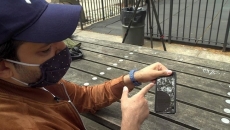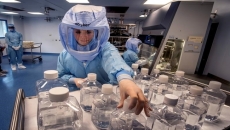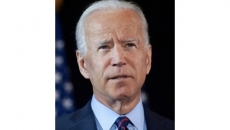WASHINGTON - Border authorities in the United States are expected to clarify in the coming days whether fully vaccinated foreigners will be required to show proof of a negative COVID-19 test in order to cross the Canada-U.S. land border.
The White House issued updated guidance Monday about its new rules for incoming international travellers, which are scheduled to take effect Nov. 8.
Those rules, which require foreign nationals to be fully vaccinated in order to enter the U.S. for non-essential purposes, clarify the requirements around testing and contact tracing, in particular for unvaccinated U.S. citizens and permanent residents re-entering the country.
Fully vaccinated foreign nationals will continue to have a three-day window in order to get tested for COVID-19 prior to boarding a flight, while unvaccinated travellers who are otherwise eligible to enter the country will need to be tested within one day.
"I think what we've done here is to tighten up and make travel safer, allowing more people to enter the country," said Dr. Cindy Friedman, chief of the travellers' health branch of the Centers for Disease Control and Prevention.
"We know that pre-departure testing does reduce transmission risk, and the closer that test is done to the time of departure, the more risk reduction that occurs."
More details about the requirements to cross the land border into the U.S. from Canada and Mexico are still to be released.
"Those land details are coming soon from Customs and Border Protection and the Department of Homeland Security," Friedman said.
Administration officials who briefed the media on the update Monday, however, hinted that the rules for crossing the land border would hew closely to the advice provided by the CDC.
"We are following the exact same CDC guidelines," said one official, who spoke on condition of anonymity under the terms of the briefing.
"CBP is working to finalize the procedures that will be used at the land port of entries. And we should get that out in the next couple days."
Despite the Canada-U.S. travel restrictions that have been in place since March 2020, the U.S. has never required "essential" land-border travellers to show proof of a negative test in order to enter the country.
Canada, however, has required travellers to submit the results of a so-called PCR test, taken within three days of travelling, along with their proof of vaccination in order to be allowed over the border.
The White House said Monday that it will accept both PCR tests — which typically run close to $200 in Canada — and the less costly antigen or rapid tests, which are available at most drug stores for about $40.
Children under the age of 18 are currently exempt from the vaccination requirement, "given both the ineligibility of some younger children for vaccination, as well as the global variability in access to vaccination for older children who are eligible to be vaccinated," the White House said.
Children aged 2-17 will, however, be required to obtain a pre-departure test — no more than three days prior to travelling if accompanied by a fully vaccinated adult, or one day if travelling alone or with an unvaccinated adult.
Other "very limited exceptions" to the vaccination requirement include certain participants in COVID-19 vaccine trials, people who can't get vaccinated for medical reasons, those granted permission to travel for emergency or humanitarian reasons and people with visas issued in countries with limited access to vaccines.
The CDC has already said it will consider any traveller who received a full course of a COVID-19 vaccine approved by either the U.S. Food and Drug Administration or the World Health Organization to be fully vaccinated for travel purposes.






